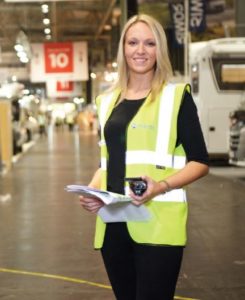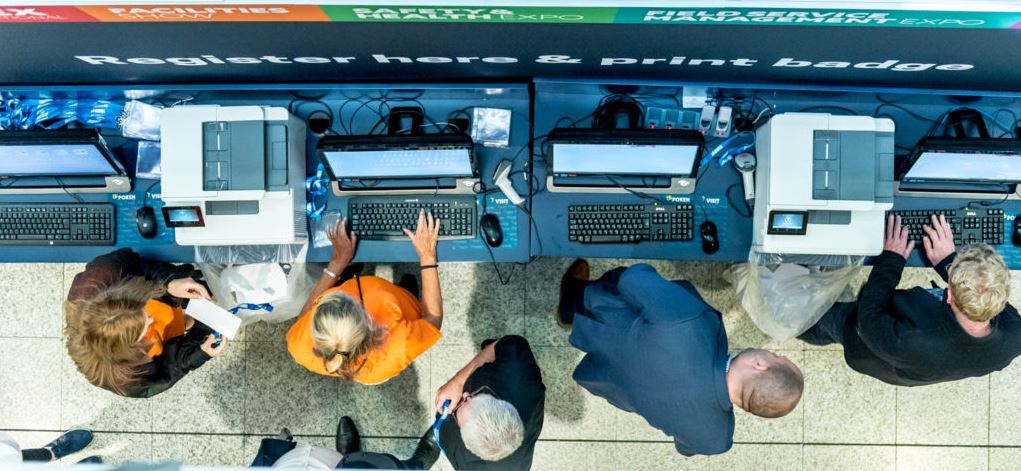Event Safety & Security
‘Regrettably in today’s day and age, organisers of large events have to be aware of the heightened security risks’
SHP speaks to Emily Peat, Director of Operations at NCC Events and formerly Events Manager at the NEC in Birmingham, about the planning process involved with running a high profile event or exhibition and what considerations need to be made.
How much of a part does Health & Safety play in your role as Director of Operations at a large events company?

Emily Peat
Emily Peat (EP): “Health and safety plays a significant part in my role. As an association, it is our responsibility to set an example of best practice in all elements of our functionality.
“I take the overview of health and safety for our two events and additionally assist with advising other NCC-based activities. Holistically, this responsibility comprises of multiple elements; ensuring the safety of all staff, exhibitors, contractors and visitors through compliance to regulation, forward planning and implementation of best practice.”
Both of your events are held at the NEC. How valuable is the experience you picked up during your eight years there as Events Manager, now you are a client hosting an event at the venue?
Emily Peat (EP): “The experience gained during my time at The NEC was invaluable. The NEC considers itself to be an industry leader in the implementation of best practice, which provided me with a good grounding and set my personal standards for health and safety very high. I am fully aware of the venue’s expected standards and am more than familiar with the paperwork and processes they employ.
“The biggest advantage however, was the exposure I was able to attain to countless events; each with their own nuances and challenges. I was able to experience first-hand organisers who employed good practices and those who used unfavourable ones; observing the implications of failing to take health and safety into consideration. This instilled a healthy respect for the importance of health and safety and opened my eyes to the ‘claims culture’ we now find ourselves in, where accountability is no longer simply a question of self-governed morality.”
What about the considerations you must make when planning an event?
Emily Peat (EP): “The two annual consumer shows we organised, Motorhome & Caravan Show and Caravan, Camping & Motorhome Show, attract approximately 100,000 visitors per show. Events can best be divided into three key phases; build-up, show open and breakdown. The varying activity within each of these phases by nature give rise to their own hazards, which need to be addressed in their own way.
“During the build and breakdown phases the halls effectively become a building site, with many of the usual hazards attributed to this type of environment. Such hazards may include vehicle movement, working at height, installation of electrical supplies, construction and the use of plant and power tools. During these phases, the persons within the halls are predominantly contractors, who are familiar with these activities and their subsequent hazards. However, the risks increase with the introduction of exhibitors, who may be unfamiliar operating in these environments. It is therefore our duty to ensure (as best possible), exhibitors are made aware in advance of the types of hazards they can expect when entering the halls during these phases and precautions they can take to protect themselves. This can be something as simple as advising them that flip flops are not suitable foot attire during this time!

“It may also be of interest to note that in 2015, the implementation of CDM was introduced into the events and entertainment industry. This fundamentally requires events to employ the same processes and measure to those used on typical construction sites.
“During the show open phase, different considerations need to be made to ensure the safety of the visiting public. The demographic of the visiting public needs to be assessed and managed as appropriate. For example, our shows have both an older demographic and families with young children; consequently, we ensure we have a strong medical provision and a robust missing child process.
“Attention needs to be paid to elements such as crowd management, food safety/hygiene and potential legionella sources. In addition, there may be more unique elements such as the welfare of ‘performing animals’ that need to be addressed.
“The key to successful pre-planning is good communication between all parties. It is imperative we continually converse with our Exhibitors to identify what activities they intend to bring into the show. We are then able to work with them in advance to help manage any associated hazards. This is especially critical when any element of public participation may be involved. These elements are know to the industry as ‘items of special risk’ and each of these often have their own set of specific regulations to be employed. Visitors increasingly expect the ‘wow’ factor and seek out more experiential events. To cater for this, it is inevitable that you invite more hazards into the show and it pays to keep on top of this.
“In addition to what could be deemed as ‘standard health and safety’ preparations, emergency planning and response also forms an integral element of this role. Regrettably in today’s day and age, organisers of large events have to be aware of the heightened security risks associated with the gathering of large numbers of people in high profile locations. It is vital that all possible measures are taken to minimise security risks and in the event of a worse-case scenario, there is a robust plan in place to manage the situation safely, quickly and efficiently.”
 Event security
Event security
What are the challenges of hosting an event as such a huge, multi-purpose, high profile venue?
Emily Peat (EP): “The sheer footprint of the show is our biggest challenge when on site. It would be physically impossible to ensure the safety of all parties with the small operations team we have in-house; as such, we employ a team of specialist ‘floor management’ staff whose primary objective is to base themselves throughout the show. These floor managers are appointed to monitor and manage activities within the halls for the duration of the event; ensuring safe working, addressing failures to comply with best practice and incident reporting.
“We are often in the position whereby we have to share the site with other events. This can cause issues in the form of traffic management or splitting of venue service resources, however this is often identified in advance by the venue teams, who put bespoke plans in place to help mitigate these issues.
“By hosting an event at an internationally renowned venue, expectations are high all round and you can feel ‘under the microscope’ to achieve the high standards often associated with the brand.
“As mentioned previously, one of the biggest issues with hosting an event at a high-profile venue (especially one located so close to key transport hubs) is the increased risk of potential terror threats. It is vital that all possible measure are taken to minimise security risks and in the event of a worse-case scenario, there is a robust plan in place to manage the situation safely, quickly and efficiently.”
Are you responsible for the health & safety for everyone on site, including build-up and breakdown days?

Emily Peat (EP): “As the Organisers of the event, it is our prime responsibility to ensure the health and safety of our staff, members of the public and contractors.
“The events industry now adopts the CDM framework during build and breakdown. As the ‘Commercial Client’ at the top of the CDM roles and responsibilities pyramid, responsibility ultimately falls to us to ensure we make suitable arrangements and appointments as required.”
Does the venue have its own health & safety teams that you have to work with?
Emily Peat (EP): “Each event is appointed a designated venue event manager who is NEBOSH qualified and is our day to day contact in regard to general health and safety matters.
“In the instance of anything unusual or high-risk, this will often be deferred up to The NEC’s in-house Health & Safety team.”
Fire safety and venue security
What about fire safety and venue security, does that fall under your remit too?
Emily Peat (EP): “The NEC building is fitted as standard with basic fire safety measures, including sprinkler systems and extinguishers etc., however it is the duty of the organiser to be aware any additional fire hazards being brought into the halls and ensure additional fire prevention / extinguishing means necessary are installed. It is a requirement that any of these additional fire risks (such as gas canisters or vehicles etc.) are highlighted on a floor plan and passed to the venue, so in the event of an emergency, the emergency services can be made aware.
“As above, The NEC has its own full-time venue staff who are responsible for the communal areas of the venue. However, in regard to show-specific security all events are allocated a Security Manager, who will compile a manning schedule based on the event’s requirements. The level of staffing required will be determined by the type of show (i.e. public or trade), visitor demographic and expected attendance. All security activity is governed by SIA legislation.”
Health & Safety used to be outscored at NCC Group, but now falls under your remit. What does that involve and how has it changed your day-to-day role?

Emily Peat (EP): “A large part of health and safety being brought back in-house centred around my experience in handling Health & Safety, along with qualifications such as my NEBOSH General certificate and NEBOSH Fire etc. These qualifications provided insurance to the NCC that I had been trained to a high standard in this field and would subsequently hold the relevant knowledge to ensure compliance and safety for the groups’ activities.
“My remit is quite broad and can entail anything from performing risk assessments, advising on DSE matters to ensuring regular PAT testing of equipment. I will also be approached in regard to wider industry matters such as best practice for working at height to acceptable lighting levels. I don’t however, profess to be a master in all fields and will often refer to the HSE / local authority or general legislation to find the most up to date answers.”
NEBOSH
How valuable has your NEBOSH qualification been in your career to date?
Emily Peat (EP): “Without the NEBOSH qualifications, I would deem myself somewhat unarmed to handle the responsibilities associated in running events of this size. To my knowledge there is no mandatory requirement for event Organisers to hold such a qualification, however there are various elements of planning an event where experience and knowledge of health and safety are invaluable. As such, there are some organisers who employ outsourced safety advisors to fill this void in knowledge. My NEBOSH qualifications and experience have equipped me with the sound knowledge required to not only plan and minimise potential hazards as effectively as possible, but also the knowledge and confidence to lead and teach others to employ best practice.”
‘Regrettably in today’s day and age, organisers of large events have to be aware of the heightened security risks’
SHP speaks to Emily Peat, Director of Operations at NCC Events and formerly Events Manager at the NEC in Birmingham, about the planning process involved with running a high profile event or exhibition and what considerations need to be made when taking into account event safety.
Ankit Kumar
SHP - Health and Safety News, Legislation, PPE, CPD and Resources Related Topics
Back for 2024: EHS Congress Berlin
Safety & Health Expo becomes part of ‘Anticipate London’ in new launch
Building Safety Act awareness e-learning course launched by CIOB



 Event security
Event security
